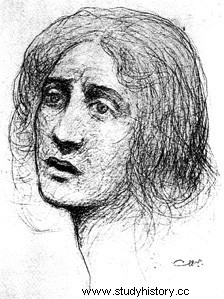Tumād̩ir bint ʿAmr, nicknamed Al-Khansā’ (before 610 – between 634 and 644), was a 7th century woman of letters and the most famous Arab poetess in Arabic literature.
Elegies

Al-Khansā’ was born before 610 in Nejd, in pre-Islamic Arabia, into a wealthy family from the Banū Sulaym tribe. The adjective Khansā’ of his nickname designates by extension the gazelle. In 612, his brother Mu'awiyah was murdered by members of another tribe and Al-Khansā' incited another of his brothers, Sakhr, to avenge him. Sakhr was wounded in battle and died a year later from his wounds.
At the time, poetesses wrote elegies for the dead and declaimed them before the tribe during public competitions. Al-Khansā' elegies in honor of his brothers who died in battle earned him respect and notoriety.
Four sons
Al-Khansā' had four sons:Yazīd, Muʿāwiyah, ʿAmr, and ʿAmrah. Contemporaries of the Prophet Muhammad, the mother and sons converted to Islam.
In 636, the four sons of Al-Khansā' were killed during the battle of al-Qadisiyyah, between the Muslim Arabs and the Sassanid Persians during the Muslim conquest of Persia. On receiving the news, Al-Khansā' reportedly said, "Praise be to Allah who honors me with their martyrdom. And I have faith in my lord to reunite me with them in his great mercy”.
The Arab poet al-Nābighah al-Dhubyānī is said to have said to her:“You are the best poetess of jinns and humans”. According to another account, he said instead:“If Abu Basir [another poet] had not already declaimed his verses, I would have said that you are the greatest poetess of the Arabs. Come on, you are the greatest poet among those with breasts”. To which Al-Khansā' would have replied:"I am the greatest poetess among those possessing testicles too. »
The poems of al-H̠ansā’ were collected in a collection of more than 1000 verses during the Abbasid period, in the 9th century.
Is that dust in your eye?
"Is it dust in your eye?
Is it pain?
Or does it shed tears
Because of a home
Empty of its inhabitants ?
My eyes resemble,
When his memory touches me,
As torrents flowing
Down my cheeks. »
Translation by Anissa Boumediène (“I, poet and woman of Arabia”, ed. Sindbad, coll. La Bibliothèque arabe-Les Classiques, Paris)
